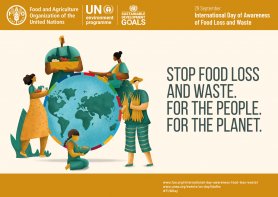
Taking Action to Transform Food Systems
On September 29th, people around the world will take part in the International Day of Awareness on Food Loss and Waste Reduction. The day serves as an opportunity to call upon both public (national or local authorities) and private sectors (businesses and individuals) to prioritize actions and move ahead with innovation to reduce food loss and waste, ultimately working towards restoring and building back better and resilient-ready food systems.
Launched by the United Nations, the International Day of Awareness of Food Loss and Waste takes place annually on September 29th, and this year’s theme is “Reducing food loss and waste: Taking Action to Transform Food Systems”.
And while all of us at AquaGrove understand why it is important to build healthy and sustainable agricultural systems, you may be asking how and why reducing food loss and waste is important in contributing to agrifood systems transformation. The answer is in the facts…
As posted on the website for the Food and Agricultural Organization of the United Nations, “Between 691 and 783 million people faced hunger in 2022, with a mid-range of 735 million (FAO, 2023). While hunger and food security continue, an estimated 13 percent of the world’s food is lost in the supply chain from post-harvest prior to retail (FAO, 2022); a further 17 percent of food is wasted in households, food services and in retail (UNEP, 2021).”
The UN reports that many of the world’s current agrifood systems are unsustainable because they have a multitude of issues including:
- Degrading agricultural land
- Contributing to greenhouse gas emissions and loss of biodiversity
- Consuming large amounts of groundwater
- Remaining vulnerable to external climate and other shocks
Reducing food loss and waste is a key factor in transforming agrifood systems; it results in increasing the availability of food, contributing to food security, healthy diets, and building resilience. Additionally, it reduces greenhouse gas emissions.
While many of the actions taken by the public sector on a global scale may appear far removed from one’s everyday life, there are many things that you can do as an individual to make a difference. Here are 5 easy actions you can take to reduce food waste:
- Buy Only What You Need – Plan your meals and trips to the market to eliminate excess food that will spoil or go to waste.
- Grow Your Own – By starting a sustainable garden, you have control of what you grow, and when you grow it. Additionally, you will be part of the solution knowing that nothing goes to waste in your garden, especially when up to 90% less water is used in an aquaponic garden (vs. traditional farming).
- Use Proper Storage – When it comes to unused or uneaten food, it is critical to store it in a way that will prevent spoiling. Consider using airtight containers in the fridge and seal packages in cupboards. You may also choose to move older products to the front of your pantry to ensure they get used prior to expiration.
- Compost – Don’t let your unused food go to waste. By composting leftover food scraps, you can give nutrients back to the soil and reduce your carbon footprint.
- Put Leftovers to Good Use – It is easy to make too much food and have leftovers. Instead of tossing them, consider freezing unserved portions or utilizing the remaining ingredients to create a new meal the following day.
In a world where millions of people go hungry every day, it is vital that we reduce food loss and waste. And with simple steps like those listed above, we can collectively make a difference, change habits, and make practices of not wasting food easy to integrate into any and every lifestyle.
To learn more about the International Day of Awareness of Food Loss and Waste (IDAFLW), visit the FAO website which offers a guide and resources for solving food loss and waste.
